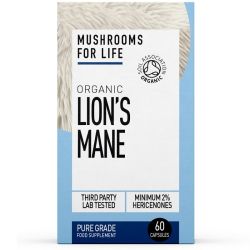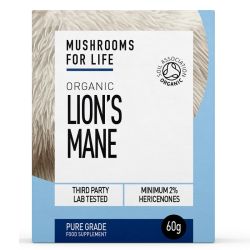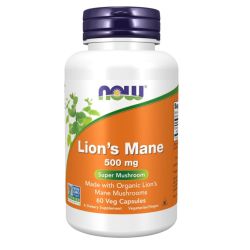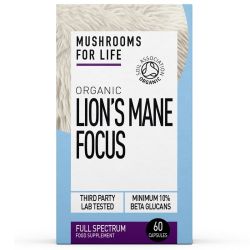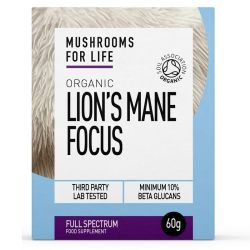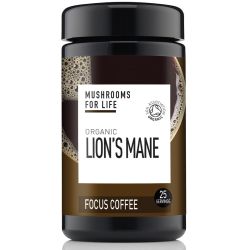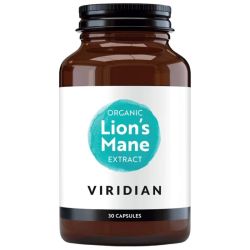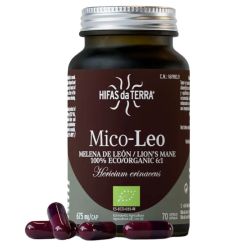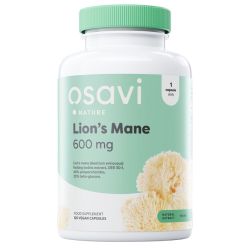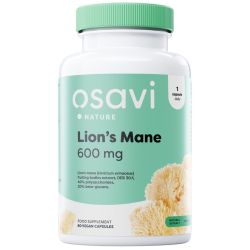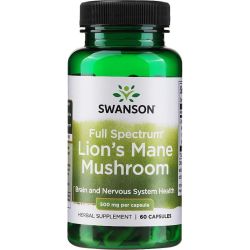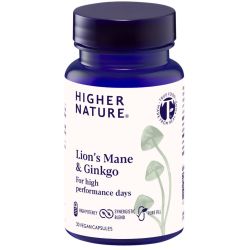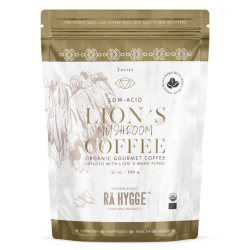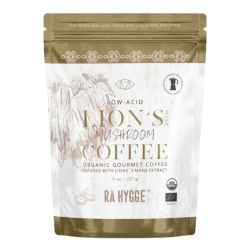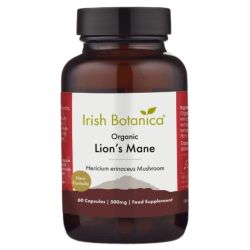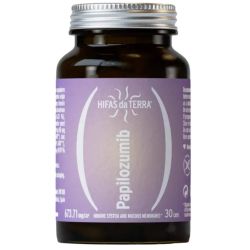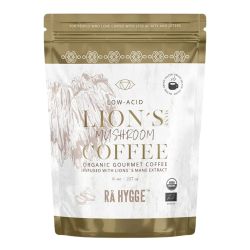Lion's Mane Mushroom Supplements
Lion's Mane Mushrooms are popularly taken as supplements and have a range of researched benefits, particuarly for their impact on cognitive function. They contain a range of bioactive substances that are responsible for these health benefits.
 Kiki Health Organic Lion's Mane Mushroom Extract Vegicaps 60Special Price £20.00 Regular Price £25.00
Kiki Health Organic Lion's Mane Mushroom Extract Vegicaps 60Special Price £20.00 Regular Price £25.00- Rå Hygge Focus Concentrated Lion's Mane Liquid Extract 100mlSpecial Price £26.99 Regular Price £29.99
- Rå Hygge Lion's Mane Filter Ground Coffee 227gSpecial Price £12.56 Regular Price £13.95Out of stock
All you need to know about Lion's Mane
What is Lion's Mane Mushroom?
Lion's mane mushrooms, scientifically known as Hericium erinaceus, are a type of edible and medicinal fungi recognised for their unique, shaggy appearance that resembles a lion's mane. These mushrooms grow on hardwood trees and are found in North America, Europe, and Asia.
What do Lion's Mane Mushrooms do?
Lion's mane mushrooms contain several bioactive substances that contribute to their potential health benefits. The most notable compounds are:
-
Hericenones and Erinacines: These are two groups of compounds that have been studied primarily for their potential neuroprotective effects. Hericenones are found in the fruiting body of the mushroom, whereas erinacines are located in the mycelium (the vegetative part of the fungus). Both compounds are believed to stimulate the production of nerve growth factor (NGF), which is essential for the growth, maintenance, and survival of neurons.
-
Polysaccharides: Lion's mane mushrooms also contain various polysaccharides, including beta-glucans. These are known for their immune-modulating effects, helping to boost the immune system and potentially reducing inflammation.
-
Antioxidants: These substances help combat oxidative stress and may reduce inflammation, contributing to overall health and potentially lowering the risk of various chronic diseases.
These bioactive components make lion's mane mushrooms particularly interesting in both nutritional and medicinal contexts, particularly in regard to brain health and immune support.
What are the benefits of taking Lion's Mane Mushrooms?
-
Cognitive Function: One of the most celebrated benefits of lion's mane is its potential to enhance brain function. Research suggests that the hericenones and erinacines in lion's mane can stimulate the production of nerve growth factor, which may support brain health and cognitive function, potentially improving memory and focus.
-
Neuroprotective Effects: Studies indicate that lion's mane may have neuroprotective properties, potentially aiding in the prevention or management of neurological conditions like Alzheimer's, dementia, and Parkinson’s disease. This is again due to its ability to promote nerve growth and repair.
-
Mental Health Support: There is some evidence suggesting that lion's mane mushrooms can help alleviate symptoms of anxiety and depression. This could be due to its anti-inflammatory effects and its potential impact on improving neuronal health.
-
Immune System Boost: The polysaccharides, especially beta-glucans, in lion's mane can help enhance the immune system. These compounds activate and modulate the immune system, potentially helping to fend off illness and infection.
-
Anti-inflammatory and Antioxidant Properties: Lion's mane contains antioxidants and has anti-inflammatory capabilities, which can help reduce oxidative stress and inflammation, factors associated with many chronic diseases.
-
Digestive Health: There is some evidence that lion's mane may help support the digestive system. It might protect against ulcers in the digestive tract, help manage inflammatory bowel disease, and foster the growth of beneficial gut bacteria.
The optimal dosage of lion's mane mushroom can vary depending on the form in which it's consumed (e.g., raw mushroom, powdered extract, or capsule) and the specific product's concentration. There isn't a universally recommended dose, as clinical studies have used varying amounts, and more research is needed to determine the most effective dosage for different health outcomes.
Here are some general guidelines based on available products and some research:
-
Powdered Extract: For lion's mane extract in powder form, dosages can range from about 500 mg to 3,000 mg per day. Many supplement manufacturers typically recommend between 1,000 mg to 2,000 mg per day.
-
Capsules: Capsules often come in doses ranging from 500 mg to 1,000 mg. Manufacturers commonly suggest taking one or two capsules once or twice a day.
-
Tea or Coffee Additives: When used as an additive in beverages like tea or coffee, the dosage will depend on the concentration of the lion's mane extract in the product. It's usually suggested to follow the manufacturer's instructions in this case.
When is the best time to take Lion's Mane Mushrooms?
The best time to take lion's mane mushroom supplements can vary depending on your personal schedule and the reasons for taking them. There isn't a universally optimal time that applies to everyone, but here are a few considerations to help you decide:
-
Morning: Many people prefer to take lion's mane in the morning, possibly with breakfast, to take advantage of its potential cognitive and energy-boosting effects throughout the day. This can be particularly beneficial if you are using lion's mane for its purported benefits on focus and mental clarity.
-
Before or With Meals: Taking lion's mane with or just before a meal can help with absorption and reduce the risk of any gastrointestinal discomfort, which is a general recommendation for many types of dietary supplements.
-
Consistent Timing: Like with many supplements, taking lion's mane at the same time each day may help maintain a consistent level in your system, potentially improving its efficacy.
-
For Sleep and Neurological Benefits: If you are taking lion's mane primarily for its potential benefits on neurological health or to improve sleep quality through its anxiety-reducing properties, taking it in the evening might be beneficial.
What are the benefits for women taking Lion's Mane Mushrooms?
Aside from the general health benefits discussed above. Women experiecing menopausal may experience symptomatic relief. Preliminary research has indicated that lion's mane might help manage some symptoms of menopause, such as sleep disturbances and mood swings. This is potentially due to its effects on nerve growth factors and cognitive enhancement.
What are the side effects of taking Lion's Mane Mushrooms?
Lion's mane mushrooms are generally considered safe for most people, and they are well tolerated when consumed as a food or supplement.
That said if you experience any kind of common allergic reaction (e.g. Itchy Skin, Rashes) then you should immediately stop using them.
Who should not take Lion's Mane Mushrooms?
Generally Lion's Mane Mushrooms are considered safe for most people however a small number of people are advised to avoid them altogether or at least to consult with a healthcare professional before taking them:
-
People with Mushroom Allergies: Individuals who are allergic to mushrooms should avoid lion's mane, as it could trigger allergic reactions, which might be severe.
-
Individuals on Medication for Diabetes: Lion's mane can potentially lower blood sugar levels. Those who are taking insulin or other diabetes medications might experience hypoglycemia if they also use lion's mane supplements without proper medical supervision.
-
Those Taking Blood Thinners: Because lion's mane may have anticoagulant effects, it could increase the risk of bleeding, particularly in people taking blood-thinning medications such as warfarin or heparin.
-
Pregnant and Breastfeeding Women: There is limited research on the effects of lion's mane on pregnant and breastfeeding women. As a precaution, these individuals should consult a healthcare provider before starting any new supplement, including lion's mane.
-
Patients with Surgery Upcoming: Due to its potential effects on blood clotting, it's generally recommended that people stop taking lion's mane at least two weeks before any scheduled surgery to avoid excessive bleeding.
-
Individuals with Low Blood Pressure: Lion's mane might also affect blood pressure. Therefore, individuals with already low blood pressure should be cautious as it might cause further lowering, which could be risky.
How are Lion's Mane Mushrooms grown?
Lion's mane mushrooms can be cultivated using a few different methods, typically involving growing them on hardwood substrates or in bags filled with sterilized sawdust and other organic materials. Here's a general overview of how lion's mane mushrooms are grown:
-
Choosing a Substrate: Lion's mane mushrooms thrive on hardwood-based substrates. Common materials include hardwood sawdust, supplemented with organic materials such as wheat bran or rice bran to enhance nutrient content.
-
Inoculation: The substrate is first sterilized or pasteurized to kill any unwanted bacteria or fungi. It is then inoculated with lion's mane spawn, which can be in the form of grain spawn, sawdust spawn, or liquid culture. The inoculated substrate is usually placed in bags with filter patches that allow for air exchange while preventing contamination.
-
Incubation: The inoculated bags are kept in a dark, temperature-controlled environment to encourage the mycelium (the vegetative part of the mushroom) to colonize the substrate. This phase typically lasts several weeks, during which the mycelium consumes the nutrients in the substrate.
-
Fruiting: Once the substrate is fully colonized, environmental conditions are adjusted to initiate fruiting. This involves changes such as exposing the mycelium to light, lowering CO2 levels, and adjusting temperature and humidity. Lion's mane prefers cooler temperatures (around 15-24°C or 60-75°F) and high humidity.
-
Harvest: Lion's mane mushrooms typically begin to form within a week or two of initiating fruiting conditions. They are ready to harvest when the spines (the hair-like structures) are long and the mushroom has fully formed but before it begins to discolor or dry out.
-
Post-Harvest: After harvesting, the substrate can sometimes produce additional flushes of mushrooms. Proper hydration and continued care can lead to multiple harvests from the same substrate over a period.
Growing lion's mane mushrooms can be a rewarding process, particularly because of their unique appearance and health benefits. It's a popular choice for home cultivators due to the straightforward growth process and the relatively low maintenance required once the mycelium is established.

